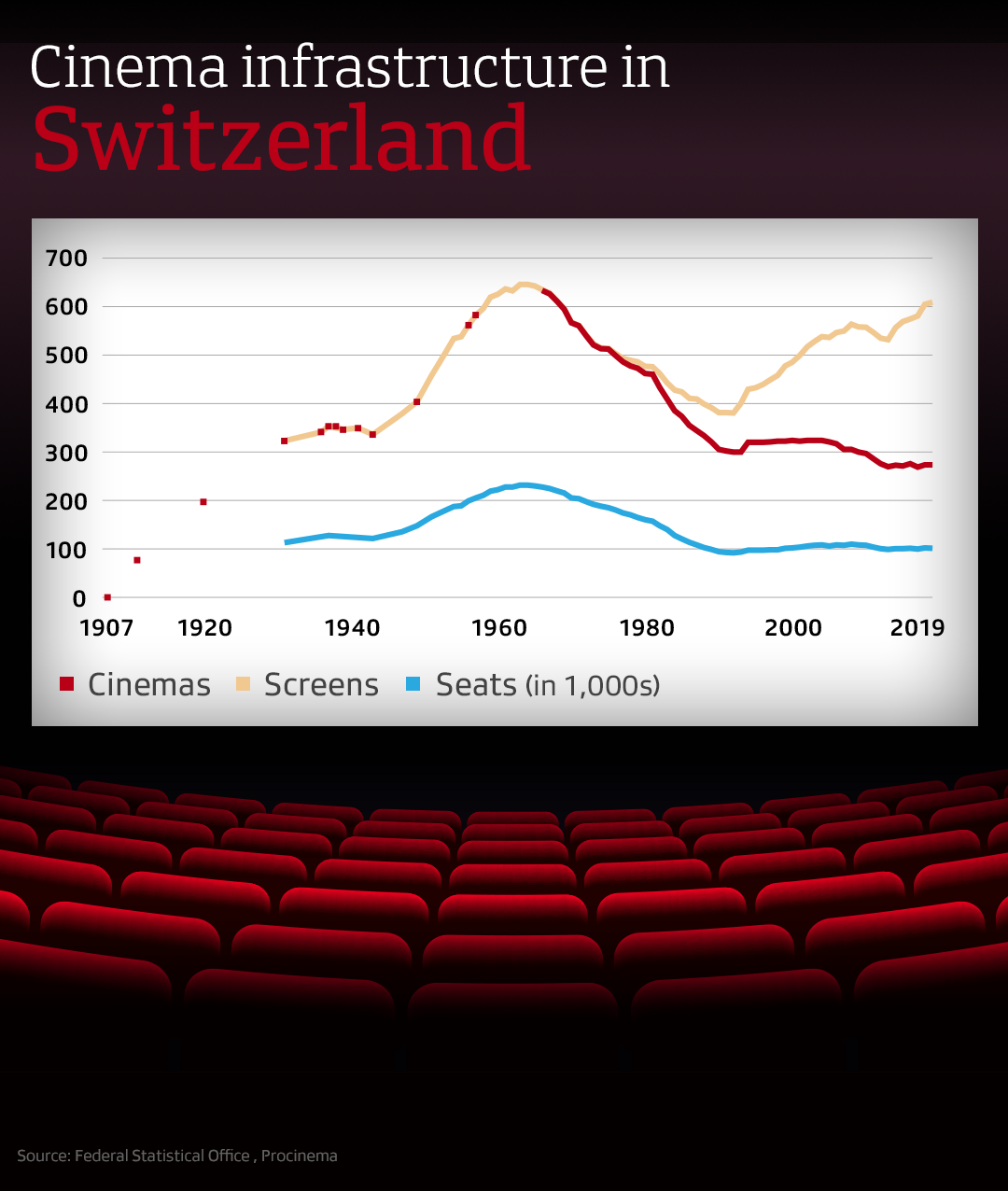Will there be a happy ending for Swiss cinemas?

With cinemas able to re-open on June 6, owners are wondering not only whether they should re-open immediately but also what films to show and whether anyone will actually turn up to watch them. One Swiss cinema-owner explains the psychological drama facing the industry since March 16, when all cinemas and theatres were ordered to close.
“I think at that point we were all relieved – the days before the lockdown were very difficult because of all the uncertainty,” says Edna Epelbaum, president of the Swiss Cinema Association, referring to the government’s decision to declare an “extraordinary situation” and basically close the country in an attempt to contain Covid-19.
“Each canton was deciding for itself, which made it very difficult for our industry, where we are all dependent on national and international releases. So at one point, the Sunday evening [March 15], half the country was already in lockdown and the other half didn’t know yet. It got to the point where we were relieved when it applied to all of Switzerland.”
But on Saturday doors can re-open, corn can re-pop and films can once again flicker across the country’s roughly 600 cinema screens. In the almost three months that the curtains have stayed down, their owners – like those of most businesses across the country – have been working out how to survive until things return to relative normal.

Epelbaum, who also owns several cinemasExternal link in Bern and Biel and in French-speaking Switzerland, tells swissinfo.ch over the phone that after a few days of no one knowing how to deal with staffing issues, “it became clear pretty quickly that all our staff could enter into so-called Kurzarbeit”. This short-time working mechanism allows employees to work at a lower percentage while their employer pays a lower salary supplemented by unemployment insurance.
Epelbaum also got an interest-free loan “that also went quickly and smoothly”. But she stresses that while the loan was “very much appreciated and still is appreciated”, it is not a subsidy. “Right now it helps cover the rest of the salaries; it helps cover ongoing bills. But it’s a loan and at some point it will have to be paid back. This is quite worrying because until now cinemas haven’t received any money other than the loan and the Kurzarbeit.”

Is it possible to say how bad 2020 will be? “I think we’ll try to forget 2020 as fast as possible and just stay positive for the future. It’s going to be a bad year. It’s going to be a very bad year.”
She points out that they missed the important spring season and the release of the latest James Bond, postponed until November. Eight Bond films feature in the 25 most successful films in Swiss history.
Ivo Kummer, head of film at the Federal Office of Culture, has said it’s clear that cinemas will have to count on blockbusters to survive the year.
“But as I always say, it’s not the first crisis that cinema has overcome and it’s not going to be the last,” Epelbaum adds.
The S word
Yet despite mothballed theatres, cancelled film festivalsExternal link and postponed film shoots, more films are being watched than ever. The big winners of the lockdown are, unsurprisingly, the streaming providers.
Film consumption is currently reaching record levels thanks to billions of people around the world stuck at home desperate for some form of entertainment. Industry leader Netflix has reported the largest growth in its history and Swiss streaming portals such as Cinefile, Filmingo and Artfilm.ch are also reporting sharply rising numbers.
“By the end of April we’d already had five times as many viewings as in the whole of 2019,” said Andreas Furler, founder and managing director of Cinefile. “And we’re convinced that streaming will remain important in the future.”
The film Mare by Swiss director Andrea Štaka, for example, which was released in cinemas just as the lockdown was imposed, is in great demand, Furler told the Keystone/SDA Swiss News Agency. Other Swiss films that should have got a big-screen release have also switched to streaming portals.
Epelbaum says several of her cinemas have joined up with Cinefile “to give our audience a chance to catch up on films they missed on the big screen and to show them our favourite films and the most successful films”.
But income from video-on-demand streaming contributes hardly anything to a cinema’s operating turnover. “This is an offer for the audience so that they don’t forget us completely,” Tobias Faust, manager of the kult.kino in Basel, told Swiss public radio, SRF. “Economically, it will never be able to make up for the damage.”

More
Swiss cinemas: more films, fewer filmgoers
Faust also worries about the really small films. “Many small, costly productions should be starting in cinemas now and have already used up their marketing budget. When cinemas are back, [these films] won’t be able to have another run and will disappear without trace.”
Epelbaum says she will keep the Cinefile platform after the lockdown is lifted “because it’s also a way to give certain films a longer life”, but she stresses that her “heart beats for the big-screen experience”.
Customer loyalty
She is not alone. A survey of German cinema-goersExternal link published on April 20 found that, given a range of free-time activities, cinema is what they missed the most: 69% said they were “very likely” to go to the cinema once restrictions were lifted, ahead of going to a restaurant (66%), using public transport (57%) and going shopping (55%).
“I think the lockdown actually proved that people do want to have a communal experience, do want to share things, do want to share stories, do want to share laughter, do want to share drama – and you can’t experience this with home cinema,” Epelbaum says.
So the big question: when will Swiss cinephiles be able to laugh and scream together again? In theory doors can re-open on June 6, but it’s not an easy decision for cinema-owners: they don’t want to open too soon and have to close again – as happened in ChinaExternal link – but they do want, and need, to make money.
“The first priority is that we want to offer cinematographic culture to the audience again; that is priority number one within a safe framework,” Epelbaum says.
“Right now we’re in contact with the different [government] departments to get an approval of our safety concepts. When this confirmation comes, in my five cities I’ll open in the French part of Switzerland on June 10 and in the German part of Switzerland on June 11.”
Epelbaum says she personally believes that since “everyone around us is now open”, there’s no reason any more for cinemas to be closed.
Switzerland is in the middle when it comes to cinemas re-opening in Europe. Curtains have already gone up in Slovenia (May 1), Iceland (May 4), Norway (May 7), the Czech Republic (May 11), Slovakia (May 20) and the Netherlands, Finland and Poland (June 1). It was possible in some German states on May 19.
Several countries will re-open after Switzerland, such as Italy (June 15), France (June 22), Austria (July 1), Britain (July 4) and Ireland (August 10).
“But it’s going to be quite a challenge because we’re very dependent on France, Germany and Italy,” she says. Distributors in Switzerland’s three main linguistic regions import dubbed versions of the latest mainstream hits from their respective neighbours and also do not have the rights to show a film before the neighbouring countries.

More
‘Maybe films should be subtitled in SMS language!’
“So the quantity of films will be probably a little bit lower than usual at the beginning of June. Nevertheless, there will be films. It’s going to be a mixture of new films and films that were cut off because of the lockdown, so-called restarts.”
Passion
The Swiss cinema landscape in general is a bit of a mixed picture. Last year eight cinemas closed, but ticket numbers and box office profits both increased.
“It’s a little bit like Forrest Gump: you have a box of chocolates and you never know what you’re going to get,” Epelbaum says. “At the beginning of the year we never really know what we’re going to get. If the content is interesting, people will come to the cinema. 2019 was a very good cinema year, a very diverse cinema year. We had a lot of different productions that were interesting enough to attract people to the cinema.”
Switzerland saw a net loss of seven cinemas last year (to 272), but entries and box office both increased. What’s more, the opening of the country’s 16th multiplex meant the number of screens stayed the same.
Total entries increased by 6.4% to 12.8 million. Two-thirds of tickets were for US films; the 875,000 tickets sold for Swiss films reflected a market share of 6.8%.
Total income increased from CHF178.7 million ($184 million) to CHF193.3 million.
The average price of a ticket increased by CHF0.30 to CHF15.50.
The average resident went to the cinema 1.5 times, up slightly from 1.4 times the previous year, although there were regional differences: those in French-speaking Switzerland went 1.9 times compared with 0.9 times in Italian-speaking Switzerland.
(Source: ProCinema)
Indeed, while the top five for 2019 unsurprisingly featured The Lion King, Avengers: Endgame and Frozen 2, cinema-goers also flocked to see psychological thriller Joker and biographical comedy-drama Green Book.
“Now, unfortunately, we’re in 2020. So box office numbers are definitely going to go down,” Epelbaum says.
“But we’re an industry with so much passion and belief in what we’re doing that I’m never afraid that we’re going to lose the taste for the cinema experience.”

More
Coronavirus: the situation in Switzerland

In compliance with the JTI standards
More: SWI swissinfo.ch certified by the Journalism Trust Initiative













Join the conversation!